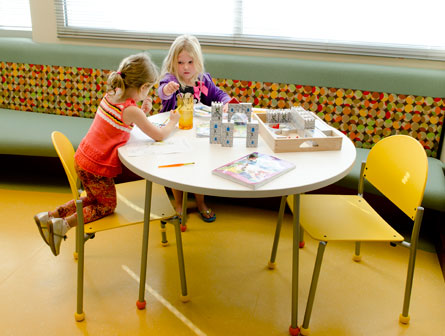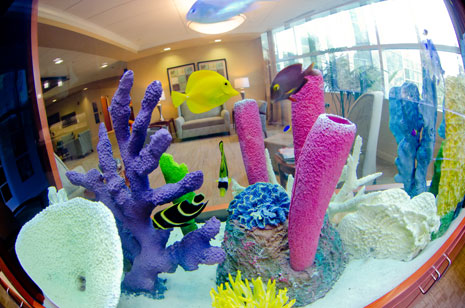USF opens one-stop memory care center designed for comfort of patients and caregivers
Mini-apartment to test ability of patients to live on their own helps set new center apart
Tampa, FL (Nov. 17, 2011) — The University of South Florida today opens a distinctive center offering people with memory disorders and their families a full range of individualized, multispecialty services in one welcoming place.
The Center for Memory C.A.R.E. (Clinical Assessment, Research and Education), on the second floor of the six-story USF Health Byrd Alzheimer’s Institute, is designed to support patients and their caregivers while providing convenient access to the latest research, technology and care.
Among its distinctive features is a unique small-scale apartment used to assess the ability of patients with memory impairments to perform activities of daily living, such as boiling a pot of water or selecting weather-appropriate clothing. Just outside a simulator helps determine driving capabilities. And clinical features include an onsite PET scanner, or positron emission tomography, that helps diagnose dementia and support drug discovery.
“Other academic Alzheimer’s centers may have pieces of what we have here, but as far as we know USF is the first to put all the services together in a one-stop shop,” said David Morgan, PhD, CEO of the USF Health Byrd Alzheimer’s Institute.
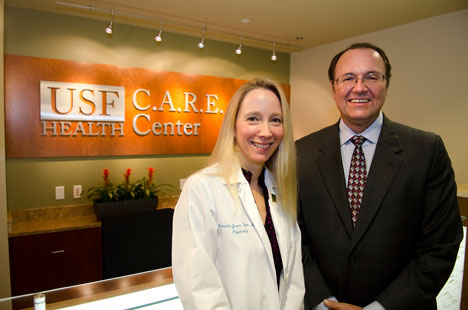
Dr. Amanda Smith is medical director and Dr. David Morgan,
CEO, of the USF Health Byrd Alzheimer’s Institute.
“A challenge to all of us in the field of Alzheimer’s disease is bringing cutting-edge technology to bear on the assessment, diagnosis and treatment of our patients, while at the same time, recognizing the human aspects of the disease and helping ease the caregivers’ burden,” said geriatric psychiatrist William Klunk, MD, PhD, co-director of the Alzheimer’s Disease Research Center at the University of Pittsburgh. “The Center for Memory C.A.R.E. reaches a new level in answering this challenge and is likely to quickly become the standard for and envy of other centers across the country.”
From the warm colors, soothing artwork and see-through aquarium in its spacious great room to a comfortable bistro where families can order in lunch while they wait, this place is not the traditionally institutional clinical fare. It’s also much more than a beautiful space.
“This is a great example of what makes USF Health and Tampa Bay unique,” said Stephen Klasko, MD, CEO of USF Health and Dean of the College of Medicine. “C.A.R.E. combines our excellence in research, clinical care, education and simulation with our passion for preventing and curing Alzheimer’s disease.”
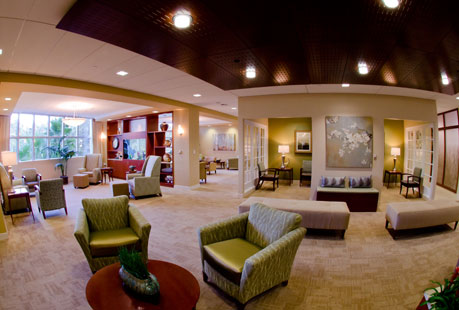
Multispecialty Medical Team
A person visiting the C.A.R.E. center will be seen by a multispecialty team, including a neuropsychologist, physician specializing in memory disorders and a geriatrician, and can undergo neuroimaging and laboratory tests at the same visit. After the comprehensive evaluation, the team makes a same-day diagnosis and recommends an individualized treatment and support plan.
Sherrill Tomasino, board chair of the USF Health Byrd Alzheimer’s Institute, says having that kind of resource one phone call away will prove invaluable for families. Tomasino, who cared for both parents after they were diagnosed with Alzheimer’s disease, recalled struggling to find specialists with expertise in memory disorders and then juggling multiple visits to separate doctors, imaging centers and labs.
“When a loved one is diagnosed with Alzheimer’s, you know it’s a tough road ahead,” she said. “So being able to come to one place to get everything done in one day, while the caregiver has some time to relax – that’s a huge gift.”
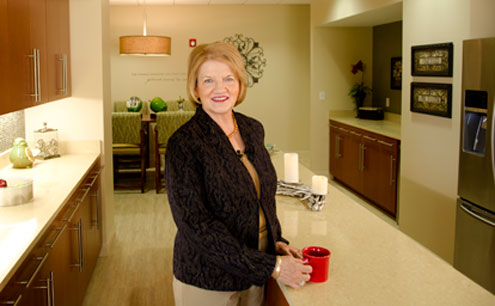
Sherrill Tomasino, board chair of the USF Health Byrd Alzheimer’s Institute,
cared for both parents after they were diagnosed with Alzheimer’s.
Living Skills Assessments
One of the biggest challenges families face when a loved one is diagnosed with Alzheimer’s is deciding whether the person can continue living alone, should move in with a caregiver, or if other options like assisted living or long-term care are needed.
With this in mind, USF integrated a Functional Assessments Facility into the center. This facility, including the small-scale apartment complete with kitchen, bathroom, bedroom and laundry area, sets the memory care center apart from others across the country, said Amanda Smith, MD, medical director of the USF Health Byrd Alzheimer’s Institute. “It’s a place where occupational and physical therapists can test the cognitive and physical abilities of patients to perform routine daily tasks. The goal is to determine whether patients can safely live on their own.”
Therapists evaluate whether patients can independently complete tasks such as picking out clothes appropriate for the weather, boiling a pot of water and turning off the stove, transferring laundry from washer to dryer, and using appropriate settings on appliances.
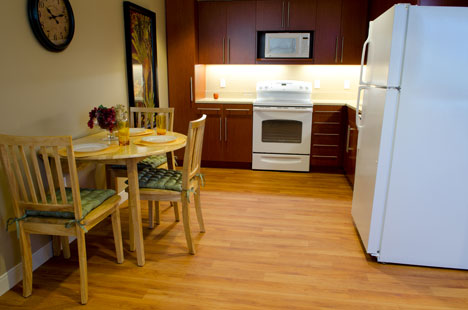
The Functional Assessments Facility features a small-scale apartment where therapists can test the ability of patients to perform routine tasks like operating
a stove to boil water and doing laundry.
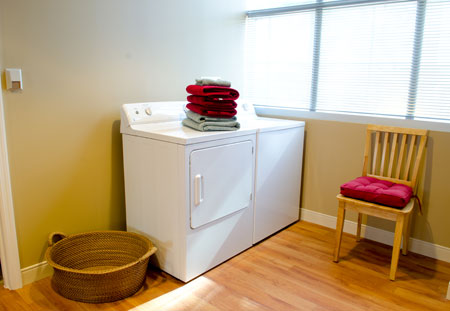
Outside the apartment, a computerized simulator recreates real-world driving conditions to measure whether it’s time for a person with Alzheimer’s to transition from driver to passenger. Some early-stage patients may drive safely for a limited time, Dr. Smith said, but the risk of driving increases as the disease advances, leading to greater memory loss, disorientation, and lapses in judgment.
Neurodegenerative changes can also greatly increase the risk of falling for people with Alzheimer’s, so a Falls Prevention Program is available to evaluate gait and balance. If deficiencies are noted, patients can receive training at the nearby USF School of Physical Therapy.
Diagnostics Capabilities
The Eric Pfeiffer PET Imaging Center houses the first onsite PET scanner in an Alzheimer’s facility in Florida, Dr. Morgan said. The technology now allows physicians and researchers to view the build-up in the brain of toxic material known as amyloid plaques years before the first signs of memory loss appear.
Mounting evidence indicates that monitoring amyloid in the brain in this pre-symptomatic stage holds promise for screening those at high risk for Alzheimer’s disease, much like physicians now do for heart disease using biomarkers like cholesterol, Dr. Morgan said. It could be a useful tool for diagnosing Alzheimer’s earlier and more accurately than clinical evaluations alone, in addition to tracking whether newly developed treatments are working appropriately in the brain.
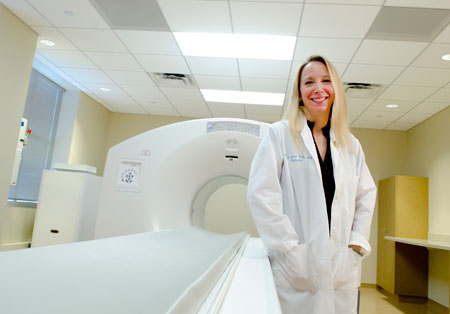
The center’s onsite PET scanner helps diagnose dementia and supports
drug discovery.
“We hope this will ultimately lead to the prevention of Alzheimer’s disease,” Dr. Morgan said. “Identify those at risk of Alzheimer’s before they show symptoms and find effective treatments to slow or reverse the amyloid accumulation, so they never get the disease.”
Along with staff’s expertise in science and technology that may lead to new discoveries, the center offers plenty of support for patients and families often overwhelmed by an Alzheimer’s diagnosis.
The Caregiver Education Resource Library provides print and online access to information like adult day care and social services near the patient’s home, caregiver support groups, elder law attorneys. At the nearby Partners in Research desk, patients and caregivers can learn about opportunities for joining clinical trials or other studies at the USF Health Byrd Alzheimer’s Institute and elsewhere on campus. Both areas flank a colorful playroom with glass walls, to accommodate children accompanying a caregiver who brings a parent or other older family member to the center.
The supervised playroom accomodates caregivers with young children.
Stress-busting Design Features
Nearly two years in the making, the center was designed to diminish the stress and apprehension of people experiencing memory problems and their families.
Rather than a typical clinical waiting room, visitors gather in a casual great room with natural lighting from large windows, a tropical aquarium, artwork depicting restful nature scenes and landscapes, and an area for watching videos or listening to music. Furniture was selected and arranged to create intimate clusters where patients and their family members can retreat between appointments and tests. Since patients in the later stages of Alzheimer’s are prone to pace, the center’s circular design even incorporates a pacing loop visible to caregivers and staff.
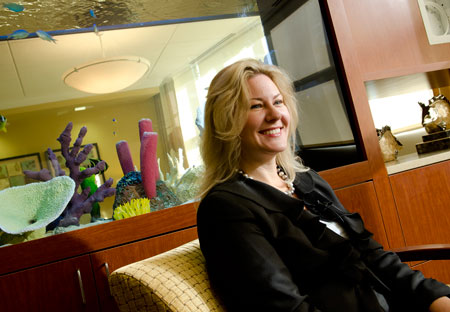
Jessica Banko, associate director of the USF Health Byrd Alzheimer’s Institute,
says the C.A.R.E. Center design is intended to help reduce the anxiety of patients and caregivers..
“Usually when you enter a healthcare facility, you feel anxious about what you’re going to find out. Maybe you don’t even want to be there and someone else persuaded you to come,” said Jessica Banko, PhD, associate director of the USF Health Byrd Byrd Alzheimer’s Institute. “The idea behind the center was to create a sort of ‘memory spa’ to evoke feelings of peace, serenity and comfort. We wanted to make the experience as inviting and positive as possible for all who would be spending quite a bit of time here.”
USF School of Architecture students, working with faculty and staff of the USF Health Byrd Alzheimer’s Institute and consultants, created the initial design concept for the Center for Memory C.A.R.E. The project was backed by research indicating that emphasizing the aesthetics of a clinical environment can help diminish anxiety, lift mood and may even improve patient outcomes.
– USF Health –
USF Health is dedicated to creating a model of health care based on understanding the full spectrum of health. It includes the University of South Florida’s colleges of Medicine, Nursing, Public Health and Pharmacy, the School of Biomedical Sciences and the School of Physical Therapy and Rehabilitation Sciences; and the USF Physician’s Group. Ranked 34th in federal research expenditures for public universities by the National Science Foundation, the University of South Florida is a high impact global research university.
USF Health Communications media contacts:
Susanna Martinez Tarokh, smartin1@health.usf.edu or (813) 974-2776
Anne DeLotto Baier, abaier@health.usf.edu or (813) 974-3303
Video by Amy Mariani, and photos by Eric Younghans, USF Health Communications

